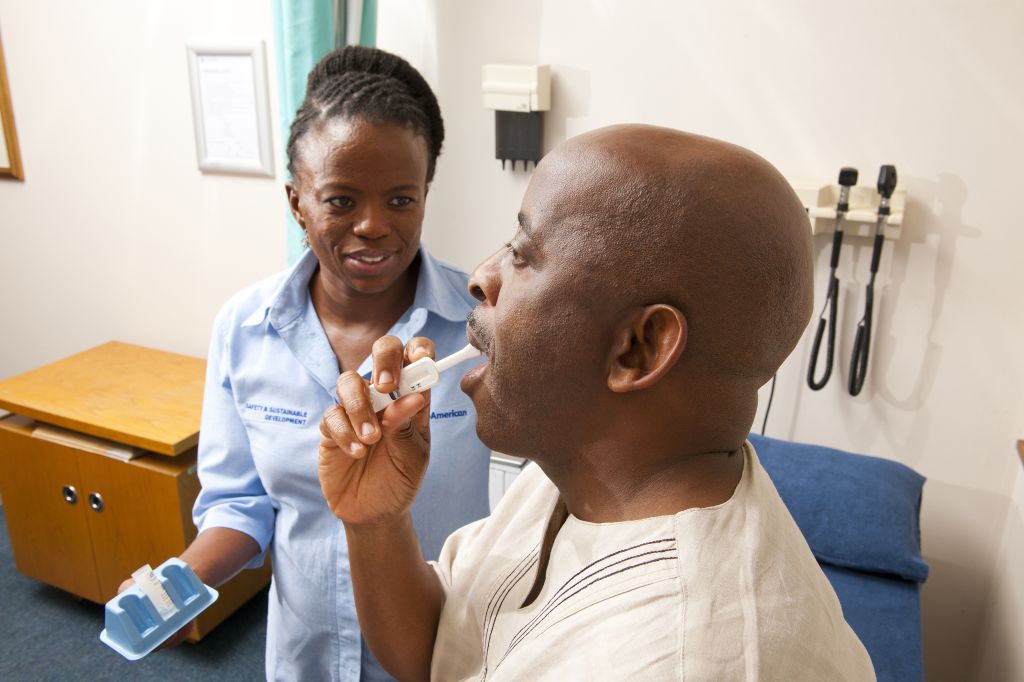World AIDS Day: international case study into workplace HIV/AIDS programmes

By Stefaan Van der Borght, Global Head of Health, Anglo American
More than 40 million people worldwide are infected with HIV, and it is estimated that 26 million of these are workers aged 15-49 – the prime of their employable years. As such, the impetus is on workplaces in affected countries to action wellbeing programmes for their people.
Apart from the obvious – and absolutely paramount – moral and human incentive of encouraging testing and providing treatment, the benefits of workplace testing can have a ripple effect: bettering not only the lives of those infected, but their families, co-workers and the population at large. The strength of a prevention programme is important to prevent new cases from occurring. Research has shown that continuous gender inequality and poor knowledge on sexual and reproductive health, certainly among adolescents, feeds the spread of the virus.
All parties – from employers to co-workers – benefit when infected parties are detected as early as possible and provided with the correct treatment to allow them to survive. It is now well established that a correctly treated person living with HIV has a much lesser chance of transmitting the infection to his or her partner.
 But there is a psychological dimension here, too. Effective treatment programmes are necessary not only to protect those affected, but also to maintain morale among staff members. At the end of the 20th century, colleagues would become ill and eventually die due to the uncontrolled infection. The perceived lack of control, emotional strain, and negative external signalling is demoralising and can inculcate learned helplessness in our teams. Even if HIV is not directly affecting our own health, it is having a huge impact on our daily lives.
But there is a psychological dimension here, too. Effective treatment programmes are necessary not only to protect those affected, but also to maintain morale among staff members. At the end of the 20th century, colleagues would become ill and eventually die due to the uncontrolled infection. The perceived lack of control, emotional strain, and negative external signalling is demoralising and can inculcate learned helplessness in our teams. Even if HIV is not directly affecting our own health, it is having a huge impact on our daily lives.
This is why employees and their managers have such a crucial role to play, as advocates to encourage testing and treatment among their peers. It does appear that fear of stigmatisation is still strong and stopping people from getting an HIV test. Stigma might even exist in a company that has pledged and maintained over more than 20 years the promise not to discriminate.
Regional significance in South Africa
For HIV infection, Southern Africa is still the most severely affected part of the world. This has particular resonance in the mining industry, which is a strong private sector player in the region, and particularly for Anglo American, whose historical roots in the continent continue to this day. We are operating in the midst of a society that is still suffering from HIV and where new cases are still occurring. Fortunately, fewer people are dying from HIV than before, and more and more people have access to treatment. At the same time, the number of new cases continues unabated. This, frankly, is unacceptable, when we are more than 30 years into the epidemic.
This only reinforces why, for miners, this cause should be one of our paramount causes. If we hone in on HIV/AIDS treatment and prevention, we will benefit the industry as well as have, perhaps, the greatest possible impact on regional health. We should bring the new infections down, assure that people start treatment immediately and continue the treatment for the rest of their lives. But the first step is getting tested. If we can demonstrate that this is possible, it will encourage others to take bold steps to reach the same goals.
In the early 1990s, the HIV prevalence in the mining industry in South Africa was around 1%, but by 2000, this number had snowballed to 25%. Immediate action was necessary, and we were swift to set up workplace testing within Anglo American, offering free treatment to all employees in 2002.[1] Taking into account this ripple effect, we soon extended the programme to include dependents of those infected employees.
We now run the world’s largest private sector testing programme for HIV/AIDS and TB, as both diseases are closely linked. After so many years of encouraging voluntary testing, we might possibly see the first signs of “testing fatigue”: less interest of management and employees to sustain testing efforts. The success of drugs to suppress the disease might have led to complacency and the perception that we are in control. This complacency is dangerous and we again see workers that come very late for testing, and we still have too many colleagues dying from the disease. The good news is that the number of our employees enrolled in HIV disease-management programmes increased 10 percent from 2014 to 2015. Now, 88 percent of our HIV-positive workforce is enrolled. If we now follow the expert advice to start treatment early, we hope to increase this number even further.
 The generation to end it
The generation to end it
As we approach World AIDS Day, we reflect on the lesson we have learnt while working towards an AIDS-free world, and think ahead to the lessons and questions still to be answered to achieve our aim. Business will have a huge role to play in this, and as leaders in the private sector, employee workplace programmes need to engage and commit to ending AIDS in line with the UN goals.
But as long as we have a single worker newly infected with HIV, we are not yet there. This is not to diminish the strides made in the 21st century so far. Rather, it is to ask another, more aspirational question: Could we be living in a society free of AIDS as a major public health problem 15 years from now? We think it is possible, and look forward to working with governments, civil society, and fellow business leaders to make this happen.
 References:
References:
[1] https://www.theguardian.com/business/2011/nov/03/anglo-american-medical-officer-brian-brink-interview
Stefaan Van der Borght is Global Head of Health, Anglo American
World AIDS Day: international case study into workplace HIV/AIDS programmes
By Stefaan Van der Borght, Global Head of Health, Anglo American More than 40 million people worldwide are infected with
Safety & Health Practitioner
SHP - Health and Safety News, Legislation, PPE, CPD and Resources Related Topics
British Safety Council Wellbeing Conference: Empowering Employees for Success
New flexible working legislation – what does it mean?
Drug and alcohol testing in a UK airport environment




